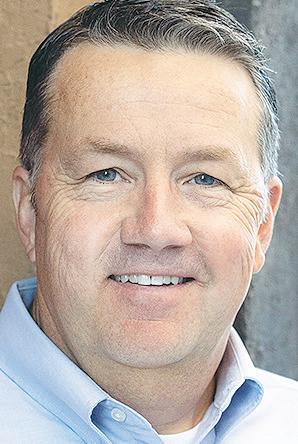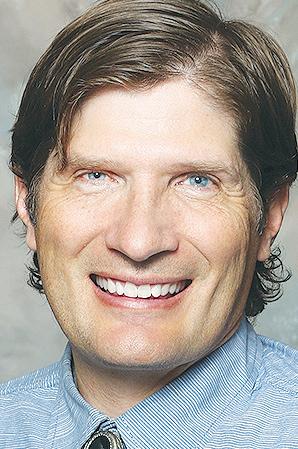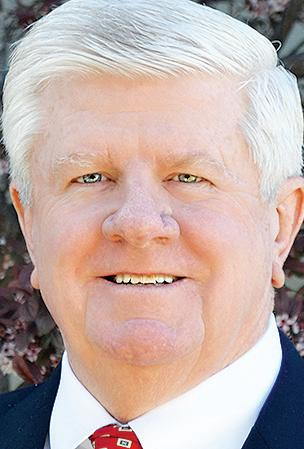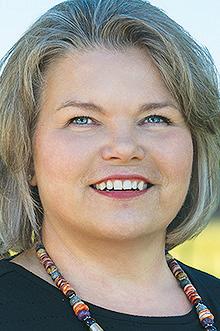In this issue
n Last-mile effort
Amazon plans to open a so-called last-mile facility in Grand Junction later this year to speed local deliveries.
n Hospitable
The CEO of a hospitality firm shared his experiences as keynote speaker at an Entrepreneurship Day luncheon.
2 2 4
The Business incubator Center has received additional recognition for efforts that support entrepreneurial activities.
n Drought outlook
THE B T Business People
Average snowpacks and runoffs are expected to equate to sufficient water despite dry conditions overall.
n Back on track?
Increases in sales and dollar volume signal what could be a return to more robust real estate activity.
n New guidance


THE DEFINITIVE SOURCE FOR GRAND JUNCTION BUSINESS NEWS SINCE 1994 MAY 9-22, 2024 VOLUME 31, ISSUE 9
The Equal Employment Opportunity Commission has issued new
workplace
Almanac 30 Business Briefs 28 Business People 30 Contributors 21-25 News 2-18 Opinion 26-27 Trends 19-20 PRSRT STD U.S. POSTAGE PAID PERMIT NO. 67 The Business Times 609 North Ave., Suite 5 Grand Junction, CO 81501 21 19 n Center of honor n Departments 5 Business Times photo by Phil Castle Proving their metal n Western Slope Iron & Supply marks 50 years. See page 2 Jim Over, center, started Western Slope Iron & Supply in 1974. His
subsequently took over. Then Dave
purchased the Grand Junction operation.
guidance on
harassment.
son, Jeff, left,
Marsh
THE BUSINESS TIMES News
Proving their metal
Three owners reflect on 50-year operation of Western Slope Iron
Jim Over remembers pulling out a map of the United States to search for possible locations for the steel fabrication business he hoped to open. While he considered several sites, he decided on Grand Junction and subsequently launched Western Slope Iron & Supply.
Fast forward 50 years, and the company Over started and his son, Jeff Over, expanded remains in business under the ownership of Dave and Elizabeth Marsh.
A recent celebration reunited the owners as well as various aspects of their lengthy story about the history of the operation.
Some themes about longevity emerged, among them the importance of paying and treating employees well, providing quality products and services to customers and adapting operations to serve new markets.
Dave Marsh says he’s grateful for what he considers a remarkable achievement. “This is really impressive. It’s quite a milestone.”
See METAL page 18

Amazon opening facility
Amazon plans to open a delivery station in Grand Junction later this year to speed local deliveries.
A 38,000-square-foot building is under construction on Saccomanno Road near the Grand Junction Regional Airport.
Business People Almanac
The Grand Junction Economic Partnership worked with Amazon on the project and joined with the City of Grand Junction in announcing the opening of the facility.

“This investment in our community underscores our vibrant and dynamic economy, capable of supporting significant projects like this,” said Curtis Englehart, executive director of GJEP.
“GJEP has collaborated closely with Amazon and its partners since the project’s inception, and we remain committed to ensuring Amazon’s success in the Grand Junction area,” Englehart said.
Sam Bailey, manager of economic development policy in Colorado for Amazon, said the so-called last-mile facility will enable the company to better serve customers in Grand Junction and the surrounding area.
expanded the operation. Dave Marsh now owns the steel fabrication business that serves commercial, government and residential markets.
Hard work and empathy key to hospitable efforts
Phil Castle
The Business Times

Phillips Armstrong Jr. has learned from personal experience entrepreneurship is hard. Entrepreneurship in the hospitality industry can be even harder.
But ambition, a willingness to take risks and empathy contribute to success that’s important not only on a personal level, but a broader one, he said. “This world needs hospitality more than it has ever needed it before.”
Armstrong, founder and chief executive officer of Destination Hospitality Group, discussed entrepreneurship, hospitality and human connections during his keynote address at the Entrepreneurship Day luncheon at Colorado Mesa University in Grand Junction.
Based in Steamboat Springs, Destination Hospitality Group operates restaurants and hotels in Colorado and Hawaii resorts. Armstrong brings to his role more than 25 years of industry experience.
Armstrong told an audience of business leaders and CMU students entrepreneurship can be difficult and the hospitality industry even more difficult. Restaurant staffs work nights,
weekends and holidays — all to serve perfect strangers.
Moreover, entrepreneurs and those who work in the hospitality industry must be willing to face failure.
But those who avoid that kind of pressure also avoid an opportunity to become great, Armstrong said.
Three attributes help in realizing success, he said, including work ethic, ambition and a willingness to take risks.
Armstrong said he learned his work ethic from his father — and in part striving to beat his dad in the daily table tennis matches they played as he grew up. “I hard to work for what I wanted.”
In addition to ambition, Armstrong said he’s learned what works and what doesn’t through mentorships and taking executives to lunch.
Armstrong described himself as a serial risk taker who once flew to South Korea to profess his love to an unrequited former girlfriend.
As for success in the hospitality industry, he said empathy, human connections and willingness to throw a party are crucial.
Armstrong said he cringes when he considers the “horrible” first question often asked of customers and restaurants and hotels: Do you have a reservation? The focus should be on why those customers what to spend their time and money at those businesses.
See HOSPITABLE page 16
Cody Kennedy, a member of the Grand Junction City Council, also praised the new facility. “This delivery, long referred to as Project Roadmap by the Grand Junction Economic Partnership, brings an Amazon facility to our city that will provide jobs while further solidifying our position as a regional hub for economic development. I’m thankful to GJEP for the work they have put in to make our community the first in western Colorado to welcome Amazon.”
The delivery station will accommodate the last mile of the Amazon fulfillment process by enabling fast delivery directly to customer doorsteps. Packages are transported to delivery stations from fulfillment and sortation centers and processed for delivery. Most Amazon employees in customer fulfillment and transportation earn between $17 and $28 an hour.
Since 2010, Amazon has created a total of more than 20,000 full- and part-time jobs in Colorado and invested more than $11.3 billion in wages and infrastructure across the state. Those investments have contributed an additional $11 billion to the economy and created than 33,000 indirect jobs. More than 8,500 independent sellers in Colorado sell goods through Amazon, creating still more jobs.
Page 2 The Business Times May 9-22, 2024
Jim Over, center, launched Western Slope Iron & Supply in Grand Junction in 1974. He son, Jeff Over, left, subsequently purchased the company and
STORY AND PHOTO BY PHIL CASTLE
F
Curtis Englehart
Phillips Armstrong

May 9-22, 2024 The Business Times Page 3


The Business Times 609 North Ave., Suite 5 Grand Junction, CO 81501 (970) 424-5133
www.thebusinesstimes.com
The Business Times is published twice monthly and distributed throughout Grand Junction, Fruita and Palisade. Advertising rates and deadlines are available upon request. Opinions expressed in this publication are those of the writers and don’t necessarily reflect the views of the publisher, editor or advertisers. Copyright © 2024 — All rights reserved



Business center gains additional recognition
Grand Valley facility selected as the runnerup for entrepreneurship center of the year award
The Business Incubator Center in Grand Junction has received additional recognition for its efforts supporting entrepreneurs and startups.
The center was named runnerup for the Entrepreneurship Center of the Year Award presented as part of an international conference on business incubation in San Antonio.

Dalida Sassoon Bollig, chief executive officer of the Business Incubator Center, said the award spotlights the work at the facility on a global stage.
“It highlights our work in entrepreneurial ecosystem building in Mesa County and the surrounding region,” Bollig said. “It reflects the hard work of our entire community and the collective commitment and dedication to fostering innovation and supporting the visionaries propelling our local economy forward.”
The center was selected for the recognition from among more than 1,200 members of the International Business Innovation Association (InBIA) from 30 countries.
The Business Incubator Center offers a range of services and programs in a single location.
The Small Business Development Center offers free and low-cost counseling and classes, including the Leading Edge business planning course. Bollig said 14 small businesses completed the latest course this spring.
The incubator program and commercial kitchen offers low-cost space and shared services for businesses.
The GJmakerspace at the center offers space, equipment and resources to entrepreneurs, inventors and others for product development, prototyping and manufacturing.
The center also operates FWorks, a
FOR YOUR INFORMATION
The Business Incubator Center is located at 2591 Legacy Way in Grand Junciton. For more information about programs and services offered at the center, call (970) 243-5242 or log on to https://gjincubator.org.
coworking space located on the second floor of the Fruita Civic Center.
In addition, the center manages a revolving loan fund offering access to capital to small businesses, a program offering tax credits for capital project and training for nonprofit organizations.
The center recently opened a satellite officer of the Circular Economy Development Center to serve the Western Slope and launched what’s billed as the AgriWest initiative with a federal grant from the Economic Recovery Corps.
The Entrepreneurship Center of the Year recognition is the latest in a series of awards for the Business Incubator Center.
The center was honored as the InBIA Dinah Adkins Incubator of the Year in 2012 and 2013. Those awards came from a pool of more than 7,000 incubators around the world.
The center was named Incubator of the Year in 1995 and 1996 and also has been listed among the top 50 InBIA best practices facilities worldwide.
“These distinctions affirm our belief in our strategic direction and fuel us with the energy and inspiration to aim even higher,” Bollig said.
Those recognitions wouldn’t be possible, she said, without the support of partners that include the cities of Grand Junction and Fruita, Mesa County and the Town of Palisade as well as the Colorado Office of Economic Development and International Trade.

Page 4 The Business Times May 9-22, 2024
F
Dalida Bollig

Andrea Lopez, external affairs manager at the Ute Water Conservancy District, details the outlook for water availability and drought conditions in Mesa County during a news conference staged near the Colorado River in Las Colonias Park in Grand Junction. Lopez was joined by, from left: Jeff Piper, an agent with the Colorado State University Extension; Randi Kim, utilities director for the City of Grand Junction; and Michael Simpson, supervisor with the Clifton Water District. (Business Times photo by Phil Castle)
Average year bodes well for local water availability
Phil Castle
The Business Times
An average snowpack and what are forecast as average runoffs are expected to equate to sufficient water in Mesa County this summer despite dry conditions overall.
That also means no mandatory restrictions are planned, although water conservation measures are encouraged.
“We’re having an average year,” said Randi Kim, utilities director with the City of Grand Junction.
Kim joined with representatives of the Clifton Water District, Ute Water Conservancy District and Colorado State University Tri River Area Extension at a news conference to detail the outlook for water availability and drought.
Those entities are among the members of the Drought Response Information Project that meet to review drought conditions and water supply as well as promote water conservation.
Kim said snow surveys conducted atop the Grand Mesa where the City of Grand Junction obtains its water are at about 89 percent of the 35-year average. Reservoirs on the Grand Mesa are full, she said.
Dust on snow could contribute to early runoff, but cooler temperatures have countered that, she said.
Michael Simpson, a supervisor with the Clifton Water District, said flows on the Colorado River from which the district
FOR YOUR INFORMATION
For more information about the Drought Response Information Project, including water conservation measures, visit https://dripinfo.com.
obtains water, are average for this time of year.
Andrea Lopez, external affairs manager with the Ute Water Conservancy District, also said snow surveys, reservoir levels and soil moisture content all point to an average water year and sufficient supplies.
The Ute Water Conservancy District is the largest domestic water provider in the Grand Valley in serving 90,000 customers, Lopez said.
Jeff Piper, an agent with the Colorado State University Tri River Area Extension, said the outlook remains favorable for sufficient water as well as large crops of peaches and cherries.
Overall conditions remain dry, however. As of April 25, the drought status in Mesa County ranged from abnormally dry to moderate drought. Lopez said conditions could worsen this summer.
Kim said the City of Grand Junction promotes such conservation efforts as replacing turf, installing more efficient appliances and using greywater systems.
F


May 9-22, 2024 The Business Times Page 5
Subscribe to the journal that means business in the Grand Valley. (970) 424-5133 or www.thebusinesstimes.com
Health information exchanges announce affiliation
A Grand Junction organization has announced an affiliation intended to unify health information exchanges in Colorado.
Quality Health Network (QHN) will integrate staff, technology and operations with Contexture, creating a combined organization serving Colorado and Arizona.

“Affiliating with Contexture is an important step forward for QHN’s participants as we work to provide the best possible HIE services, putting data into the hands of care providers when they need it,” said Marc Lassaux, executive director and chief executive officer of Quality Health Network. “Our team is excited to provide enhanced services tailored to

the needs of the medical, behavioral and social service provides we serve.”
Melissa Kotrys, CEO of Contexture, said the affiliation will build on past collaborations.
“When Contexture and QHN began the affiliation process, we realized just how vital this coming together would be for the state of Colorado and beyond,” Kotrys said “Our participants desire more than standard HIE services to meet their organizational objectives. And by affiliating with QHN, Contexture will continue to enhance our solution offerings to keep up with essential community health needs.”
Quality Health Network was founded in 2004 by five health care partners to share health care information and
coordinate patient care. Today, QHN serves as a health information exchange for all the hospitals and 90 percent of providers in a region spreading across 30,000 square miles.
With headquarters in Denver and Phoenix, Contexture operates one of the largest health information organizations in the western United States.
An exploration of a possible affiliation was announced in August. The board of directors of Quality Health Network and Contexture approved the move in April.
“By affiliating with QHN, our organizations will continue to build upon our shared successes in providing health information to providers and the people they care for across Colorado, Arizona and other regions,” Kotrys said. “We’re eager to continue this journey towards a more unified health data utility.”

Intermountain receives grant for workforce pilot program
Intermountain Health has received a $1.9 million grant to launch an effort to promote the development of the health care workforce in the Grand Junction and Denver areas.
Intermountain Health was among 43 recipients of Opportunity Now Colorado grants provided through the Colorado Office of Economic Development and International Trade. The grants are intended to spur innovation in education for employment and workforce development.
Intermountain Health will use the grant to fund Pathfinders, a pilot program to engage, hire and provide upfront tuition for people seeking entry level health care jobs.
“It’s no secret the nature of work is changing, and employers around the world are needing to adapt in new, innovative ways. I’m proud to say at Intermountain, we aren’t just adapting, we’re leading the way through programs like Pathfinders,” said Heather Bruce, chief people officer at Intermountain Health. “By staying true to our values and embracing new ways to reach future employees, we can build the kind of diverse talent pipeline that ensures Intermountain Health will continue to innovate, adapt and succeed.”
The Pathfinders program will provide job matching based on skills, on-the-job training, portable credentials, mentoring and career steps toward higher-level health care jobs. The program also will include upfront tuition to complete certifications or pursue college degrees.
The program will benefit job seekers in the Grand Junction and Denver areas who are unemployed or work in jobs that pay less than $15 an hour and don’t hold fouryear college degrees. The program also aims to reach nontraditional students, including people over 25 years old, full-time workers and parents.
Job applicants who are hired and accepted into the Pathfinders program can start in roles as certified nursing assistants, See GRANT page 16
Page 6 The Business Times May 9-22, 2024
F
Marc Lassaux Melissa Kotrys

M 9-22, 2024 T B T P 7
Inn charges guests in a different way with stations
Travelers driving electric vehicles to the Colorado Wine Country don’t have to worry about running out of juice once they get there.
The Wine Country Inn now offers charging stations for all-electric and plug-in hybrid vehicles.
The 40-amp, 240-volt, dual port stations can simultaneously charge four vehicles in one-hour increments for up to four hours. That includes Tesla models with adaptors.
“This wide spectrum of models and the quicker charging time is a major convenience for hotel guests or visitors who might otherwise have to search for charging stations in the area,” said Ian Kelley, general manager of the 80-room boutique hotel in Palisade. “They can charge up while having dinner, lounging by the pool or resting.”
The owners of the Wine Country Inn consulted on the project with David Miller, a senior vice president
at Alpine Bank who spearheads so-called green team efforts to promote renewable energy and environmental sustainability.
Kelley said electric vehicle charging stations might be something of a novelty for now, but he’s confident they will be commonplace in a few years. “This is a major capital investment for sure, but the projections convinced us that the demand would grow exponentially sooner rather than later. The incentives offered by the State of Colorado help on cost, too. Besides, we strongly believe in doing what we can to support cleaner energy consumption.”
Miller was among the first to test the Wine Country Inn chargers for his Chevy Bolt EV. Saunders Collins, director of sales at the hotel, used port to top off the battery on her Tesla.


Grand Junction City Council elects mayor, mayor pro tem
Abe Herman has been elected as mayor of Grand Junction, while Randall Reitz will serve as mayor pro tem for terms running through April 2025.


The city council fills the two positions each year from among its members.
“I have been very proud to serve on the city council for the past three years,” Herman said. “And after my two-year term as mayor pro tem, I am well prepared to accept the role of mayor to guide my follow council members in policy setting for the city.”
Herman owns and operates the Sukkah Project, a small business based in Grand Junction that ships products to customers nationally and internationally.
He holds a degree in philosophy from the University of Colorado.
“When community members decide to run for city council, they are making a commitment to our city and to making a difference for those who work, play, visit and live in Grand Junction,” Herman said Reitz serves on the faculty of the St. Mary’s Regional Hospital family residency program. He previously served as chief executive officer of the Summit Community Care Clinic in Frisco.
He holds a doctoral degree in marriage and family therapy from Brigham Young University, a master’s degree in marriage and family therapy from Indiana State University and bachelor’s degree in human development from BYU.
F
Page 8 The Business Times May 9-22, 2024
F
The Wine Country Inn now offers charging stations to accomodate travelers with all-electric and plug-in hybrid vehicles. (Photo coutesy Wine Country Inn)
Abe Herman
Subscribe today (970) 424-5133 www.thebusinesstimes.com
Randall Reitz

May 9-22, 2024 The Business Times Page 9
Groundbreaking ceremony set for recreation center
A groundbreaking ceremony has been scheduled for a new community recreation center in Grand Junction.
The City of Grand Junction has scheduled the event for 10 a.m. June 1 at Matchett Park with additional activities planned at the park that day.

“The groundbreaking is the exciting first step in the construction of the new Grand Junction Community Recreation Center,” said Mayor Abe Herman. “This new facility was made possible due to the hard work and dedication of city staff, city council and, most importantly, our community members.”
“Thanks to our successful partnership with Intermountain Health St. Mary’s Regional Hospital and
grants like those from the Department of Local Affairs, the city has been able to overdeliver on the community recreation center, far beyond what was promised to the voters who passed the ballot initiative in 2023. The new recreation center will offer something for everyone at every age in our community to enjoy,” Herman said.
In addition to the groundbreaking ceremony, activities will include:
n A 5-kilometer fun run starting at 8:30 a.m. sponsored by the Grand Junction Sports Commission. Proceeds from registration will go to the Grand Junction Parks and Recreation youth program scholarship fund.
n A disc golf Tournament starting at 8:30 a.m. sponsored by Grand Valley Disc Golf Club.
n A virtual tour of the community center using QR codes.
n Bump-n-jumps sponsored by Grand Valley Power and youth activities and games provided by St. Mary’s Regional Hospital.
n Music by Ryan Gris.
n A barbecue lunch from Colorado Q for the first 450 people will be provided in the space of the future community rooms courtesy of FCI Constructors.
The Grand Junction City Council adopted the final plans for the Grand Junction Community Recreation Center in November 2022. That became the basis for an April 2023 ballot initiative approved by voters that included a 0.14 percent sales tax increase and the debt necessary to build the facility. Community engagement over the course of several decades resulted in the final design of the new recreation center.

Public meeting planned for May 30 to gather comments on park improvements
A public meeting is scheduled for May 30 to hear public comments on improvements to Hawthorne Park in Grand Junction.
The meeting is set for 5:30 p.m. in the shelter at the park at 400 Gunnison Ave.
In addition to the meeting, community members are invited to engage by completing the survey at EngageGJ.org. This survey asks for insights as to what types of improvements are most important. The survey will remain open through May 23. The survey will also appear in the May Grand Junction Parks and Recreation enewsletter, and paper copies will be available at the meeting.
Following a decision by the Grand Junction City Council on April 19 regarding the proposed design contract to add a bike pump track to a portion of Hawthorne Park, city staff has been working on a revised plan.
The agenda for the meeting was revised to gather input on community ideas for use of the park and needed improvements, including potentially replacing the playground.
The results of comments gathered through the public process will be used to develop staff recommendations that will be presented to city council for consideration as the next steps in the process to update Hawthorne Park.
There is $340,000 budgeted for Hawthorne Park improvements in the 2024 budget. Funding sources to improve Hawthorne Park include $200,000 in conservation trust funds and $140,000 from the .75 percent sales tax fund.
The public process to gather input is planned to extend into June, and staff expects funding for Hawthorne improvements will be considered as a part of the 2025 budget process.
Page 10 The Business Times May 9-22, 2024
F
Abe Herman
F Subscribe today (970) 424-5133 www.thebusinesstimes.com



May 9-22, 2024 The Business Times Page 11
HopeWest joins in childhood bereavement program
HopeWest has been selected to participate in a childhood bereavement program.
HopeWest was among 11 grief-centered organization selected by Judi’s House and the JAG Institute as what’s billed as Changemakers. Over the course of a year, participating organizations will receive guidance and recommendations to address data and evaluation needs that will inform planning and funding to meet the needs of the estimated 96,000 children in Colorado who experience the death of a parent or sibling by age 18.
“HopeWest Kids plans to harness the Changemaker program’s educational gifts to maximize our data and reporting capabilities. This will help us review and formulate our program initiatives, ensure we are meeting our community’s needs and help provide robust information on our grant applications,” said Jessica Boff,
HopeWest director of bereavement services. “HopeWest Kids is completely supported by philanthropy and relies on funding from grants and donations. It’s important to our team that no child is ever turned away, regardless of financial circumstances.”
By refining data collection processes, Boff expects HopeWest to not only secure greater funding for programs, but also better meet the specific needs of children experiencing grief. This step allows for more tailored bereavement services and a deeper understanding of how to engage effectively with children and teens ages 3 through 18.
Boff said the Changemaker program aligns with the HopeWest mission of changing the experiences of families dealing with aging, illness and grief.
Micki Burns, chief clinical officer of Judi’s House
and the JAG Institute, said the institute team works with bereavement professionals to strengthen their programs through evaluation methods. “Together, we learn about innovative interventions that are changing the trajectory for grieving children and their families across the nation and build competecy in using data to tell impactful stories.”
Judi’s House and the JAG Institute is a research-based organization in Denver devoted to supporting grieving children and their families.
HopeWest operates an in-patient hospice center in Grand Junction and provides hospice, palliative care and grief support services in a large area of Western Colorado. HopeWest Kids provides guidance and support to children and teen-agers dealing with challenges related to the serious illness or death of a loved one

Efforts begin to fight the bite in Grand Valley
Efforts are under way fight the bite in the Grand Valley.

Crews with the Grand River Mosquito Control District are treating areas of standing water where the largest populations of mosquito larvae have been found.
“Staying ahead of the potential problem is critical,” said Tim Moore, manager of the Grand River Mosquito Control District. “We have a crew of 18 seasonal field technicians actively working to combat the larvae before the mosquitos mature into flying adults.”
The district treats more than 2,500 private properties and 10,000 mosquito breeding sites as well as public open spaces in the Grand Valley. In Grand Junction, the mosquito season runs from May to October.
Nearly 50 mosquito species are found in Colorado.
“The most dangerous variety is the Culex mosquito,” Moore said. “They can transmit the deadly West Nile Virus to humans, birds, farm animals, dogs, cats and even other mosquitos”
According to the Colorado Department of Public Health & Environment, 631 people were infected with West Nile Virus and 50 people died in 2023. Fifteen cases of West Nile Virus were reported in Mesa County.
Moore said individuals can join in the fight against the bite by draining standing water on their properties. That includes clearing gutters of debris, discarding old ties, cleaning pet water dishes and bird baths and repairing leaky outdoor faucets.
“Encouraging your friend and neighbors to also eliminate sources on their own property is critical to a community wide control program,” he said. “Mosquitoes require water to complete their life cycle. If their water source is eliminated, so are their offspring.”
Page 12 The Business Times May 9-22, 2024
F
Tim Moore
F



May 9-22, 2024 The Business Times Page 13



United Way organizing Day of Action
Registration remains open through May 27 for an upcoming event that will connect volunteers from local businesses with hands-on projects that benefit nonprofit organizations.

United Way of Mesa County has scheduled what’s billed as a Day of Action for 9 a.m. to 3 p.m. June 4. A free breakfast will be served to registered volunteers the morning of the event.
“The Day of Action represents a unique opportunity for our community to come together and create real impact, supporting organizations in completing projects they might otherwise struggle to achieve,” said Keira Auld, community impact manager with United Way of Mesa County. “Many individuals may also wish to volunteer, but find it challenging to commit on an ongoing basis. This event provides a wonderful way to give back that accommodates busy schedules.”
Auld said volunteer opportunities for the Day of Action have been sourced from such organizations as the Community Food Bank of Grand Junction, HomewardBound of the Grand Valley, A Little Help and the Counseling & Education Center. A diverse range of partners ensures volunteers can engage with causes that align with their interests. Project tasks range from painting and clean-up to yard work and beyond, she said.
Businesses and organizations seeking a team-building experience for employees are encouraged to participate in the Day of Action, Auld said. Volunteering in this one-day initiative not only offers an opportunity to contribute to the community, but also provides valuable insights into the essential services offered. Moreover, the event will foster camaraderie and collaboration among participants, strengthening community bonds, she said.
Interested volunteers can learn more and register at www.dayofactionmc.org, where they can select one of the many projects submitted by local agencies. F
Page 14 The Business Times May 9-22, 2024
News, views and advice you can use Subscribe to the journal that means business in the Grand Valley. (970) 424-5133 www.thebusinesstimes.com
Keira Auld



May 9-22, 2024 The Business Times Page 15

Grant
Continued from page 6
medical assistants or sterile processing technicians, and that can lead to careers in nursing, imaging and behavioral health.
Through a series of specific career steps and completion of corresponding higher education degrees, employees can become a nurse, radiology technician or licensed clinical social worker. Career pathways include one path for nurses who work in hospital units or clinics and another path for nurses who work in operating rooms.
Participants will have access to financial coaching, transportation, nutrition support, medical premium assistance and education funding.
Pathfinders participants will be hired as an Intermountain caregiver and begin on-thejob training in departments led by managers specially trained to support their success. Learning opportunities will include health care credentials, resume writing, interview skills and English language learning. Training also will include such workforce readiness skills as self-empowerment, communication, problem solving and community membership.


Program participants will use the FutureFit artificial intelligence platform to start the job matching process. The platform uses proprietary algorithms to deduce job seekers’ skills and guides discovery of in-demand career pathways, skills, gaps, relevant learning and resources and quality job opportunities. Intermountain’s recruiting team will hire qualified candidates from the FutureFit skills-based hiring platform, which recommends candidates based on skills and potential.
The program will be open to 30 people for each year of the pilot project for a total of 60 people. Intermountain Health expects to expand the program to other Colorado employers and locations.
For more information about available jobs with Intermountain Health in Grand Junction and Denver, call (800) 843-7820, visit https://intermountainhealthcare.org/ careers/explore-careers or send an email to recruitment@imail.org.
Hospitable
Continued from page 2
Those seeking success in the hospitality industry should have empathy, Armstrong said. They should strive to make human connections in a digital world.
Moreover, they should be willing to throw parties for their guests, he said. “You’re there to throw a party for other people.”
It’s all part of what Armstrong said is a badly needed effort to improve the human experience.
Page 16 The Business Times May 9-22, 2024
F
F FOR YOUR INFORMATION



May 9-22, 2024 The Business Times Page 17

Metal
Continued from page 2
Western Slope Iron & Supply still operates at the site on 23 Road where Jim Over stated the business. But the operation has expanded over 50 years with a total of 35,000 square feet of shop space on 7 acres. The company maintains the largest inventory of product of any firm between Denver and Salt Lake City and a fleet of trucks to haul products to construction sites.
Western Slope Iron turns raw materials from mills into the steel beams, joists, stairs, railings and other components used in commercial, industrial, residential and government projects.
Many of the large buildings erected in the Grand Valley over the years include steel from Western Slope Iron, Marsh says. That includes Community Hospital as well as buildings on the Colorado Mesa University campus in Grand Junction. The Grand Junction High School under construction constitutes one of the biggest projects ever for the company, he said.
Western Slope Iron also has provided structural steel for high-rise hotels, condominiums and other buildings at ski resorts often featuring complex roof lines, Marsh says. In addition to CMU, the firm supplies products for buildings on other university and college campuses.
The company serves a far-flung region of the western United States that includes Colorado as well as Arizona, New Mexico, Nevada, Utah and Wyoming.
Marsh says the bulk of business for Western Slope Iron comes from contracts for specific projects in which the company not only supplies components, but also works with architects in designing the way those components fit together to construct the buildings. Working with detailers and erectors, Western Slope Iron can provide complete steel packages for delivery and erection.
The size and scope of the operation has grown from what Jim Over started in 1974.
Over says he worked for a steel fabrication business in California and handled small jobs on his own, but wanted to relocate and run his own company. He says he considered a half

dozen possible locations, but decided on Grand Junction because the city offered a large enough base of customers.
He initially fabricated adjustable storage racks and rebuilt cement truck tanks in addition to handling other custom work.
Jeff Over says he studied engineering at the Colorado School of Mines and subsequently worked in surveying. But he returned to the Grand Valley to join his father in operating Western Slope Iron & Supply. “I was excited to be back into it.”
Jeff Over says he modernized and expanded the operation to supply structural steel components for large buildings in the Grand Valley as well as ski resorts.
He purchased Western Slope Iron & Supply from his father, discussing the terms over what he recalls was orange julius drinks at the Mesa Mall.
Marsh says he joined Western Slope Iron & Supply after graduating from college and initially worked as a fitter and welder before becoming a project manager. He went on to purchase the company from Jeff Over.
Marsh and Jim and Jeff Over attributed the longevity of Western Slope Iron & Supply to several factors, chief among them paying and treating employees well. “I have a deep appreciation for employees and what they do,” Marsh says. “All jobs are critical to the quality of products and the success of the company.”
Jeff Over agrees. “You couldn’t do it without employees.”
The three also attribute long-term success to the relationships nurtured with customers and based on quality products and service. Jeff Over says the repeat business so important in the industry depends on honesty and integrity.
Marsh says modernizing operations and adapting to new markets has promoted efficiency and growth. Automated equipment has shortened processes that used to take four hours to a matter of minutes.
As for the next 50 years for Western Slope Iron & Supply, Marsh says he looks forward to continued growth and improvement. “We’ll just keep doing what we do and continue to get better at it.”

Page 18 The Business Times May 9-22, 2024
F News, views and advice you can use Subscribe today to the journal that means business in the Grand Valley. (970) 424-5133 www.thebusinesstimes.com
INDICATORS AT A GLANCE
n Business filings
t New business filings in Colorado, 40,987 in the fourth quarter, down 16 percent from the fourth quarter of 2022.
n Confidence
t Consumer Confidence Index 97 in April, down 6.1.
s Leeds Business Confidence Index for Colorado, 53.7 for the second quarter, up 8.4.
t National Federation of Independent Business Small Business Optimism Index 88.5 for March, down 0.9.
News Trends Contributors Opinion Business Briefs Business People Almanac
n Foreclosures
t Foreclosure filings in Mesa County, 16 in April, down from 23 in March 2023.
t Foreclosure sales in Mesa County, 3 in April, down from 6 in April 2023.
n Indexes
t Conference Board Employment Trends Index, 111.25 for April, down 0.91.
t Conference Board Leading Economic Index 102.4 for March, down 0.3%.
t Institute for Supply Management Purchasing Managers Index for manufacturing, 49.2% for April, down 1.1%.
t Institute for Supply Management Purchasing Managers Index for services, 49.4% for April, down 2%.
n Real estate
s Real estate transactions in Mesa County, 373 in April, up 16.6 percent from April 2023.
s Dollar volume of real estate transactions in Mesa County, $170 million in April, up 19.3% from April 2023.
n Sales
s Sales and use tax collections in Mesa County, $4 million for March, up 6.9% from March 2023.
n Unemployment
t Mesa County — 4.3% for March, down 0.4.
s Colorado — 3.7 % for March, up 0.2.
s United States — 3.9% for April, up 0.1.
Real estate back on track?
April gains signal what could be a more robust Mesa County market
Phil Castle The Business Times
Year-over-year increases in sales and dollar volume signal what could be a more robust real estate market in Mesa County.
“There’s a recovery in the works — possibly,” said Robert Bray, chief executive officer of Bray & Co. Real Estate based in Grand Junction. “There’s some action in the marketplace.”
While higher interest rates on mortgages hamper sales, demand remains strong, Bray said. Increases in existing residential inventory and new home construction offer more selection.
Jenn Hardey, marketing director for Fidelity National Title in Colorado, said 373 real estate transactions worth a total of $170 million were reported in Mesa County in April. Compared to the same month a year ago, transactions increased 16.6 percent and combined dollar volume rose 19.3 percent.


Hardey said several large transactions bolstered dollar volume in April 2024, including the sale of the Grand Villa assisted living facility for $5 million, a 572-acre parcel on Soaring Eagle Drive for $3.4 million and Freeway Bowl for $2.4 million.
Through the first four months of 2024, 1,100 transactions worth a collective $547 million were reported. Compared to the same span in 2023, transactions increased 2.4 percent and dollar volume rose 20.3 percent.
According to numbers Bray & Co. tracks for the residential real estate market, 261 transactions worth a total of more than $118.6 million were reported in Mesa County in April. Compared to the same month a year ago, transactions increased 14.5 percent and dollar volume rose 23 percent.
For the first four months of 2024, 761 transactions worth a total of nearly $323.3 million were reported. Compared to the
same span in 2023, transactions decreased 4.2 percent and dollar volume edged down less than 1 percent.
Bray said April gains reduced what were in March double-digit year-over-year differences in year-to-date numbers for sales and dollar volume. “It gets your attention.”
Higher interest rates on mortgages continue to curtail homes sales, Bray said, in not only making financing more expensive, but also making homeowners otherwise interested in selling and buying something else reluctant to do so for fear of trading existing mortgages with low rates for new mortgages with higher rates.
But many transactions involve cash, he said. Other buyers make larger down payments and borrow less to reduce the effects of higher rates.
Increases in existing residential inventory and new home construction offer more selection, Bray said.
As of the end of April, there were 444 active listings in Mesa County. That’s up 8.3 percent from a year ago.
A total of 184 single-family building permits were issued in Mesa County through the first four months of 2024, an increase of 27.8 percent from the same span in 2023. “New construction is back.”
Construction not only brings more homes to the market, but also contributes to the local economy in terms of the jobs provided and materials purchased, he said.
Persistent demand continues to push home prices higher, Bray said. At $385,000, the median price of homes sold during the first four months of 2024 was 4.1 percent above the same span in 2023. Looking ahead, Bray said he expects the Federal Reserve to lower interest rates by the end of the year. But homebuyers who wait for rates to drop could face higher prices.
Bray said he also expects the number of real estate transactions in 2024 to top 2023. “It’s been good, but I think we’ll see a more healthy real estate market.”
In the meantime, property foreclosure activity remains minimal in Mesa County. Hardey said 16 foreclosure filings and three foreclosure sales were reported in April. Through the first four months of 2024, 57 filings and 13 sales were reported. F
Confidence index dips third straight month
A monthly measure of consumer confidence declined for a third straight month on less upbeat assessments of labor and business conditions.
The Conference Board reported its Consumer Confidence Index retreated to 97 in April, down from a revised 103.1 in March. Measures of current conditions and short-term expectations both decreased.
 Dana Peterson
Dana Peterson
“Confidence retreated further in April, reaching its lowest level since July 2022 as consumers became less positive about the current labor market situation and more concerned about future business conditions, job availability and income,” said Dana Peterson, chief economist of the Conference Board.
The New York-based think tank bases the index on the results of monthly household surveys.
Peterson said the latest results reflect concerns about higher prices, politics and global conflicts. The perceived likelihood of a recession over the next year rose slightly, but remained well below the May 2023 peak, she said.
Less upbeat assessments of labor conditions pulled down the present situation component of the index 3.9 points between March and April to 142.9.
The proportion of consumers responding to the survey upon which the April index was based who called business conditions good rose 1.4 points to 20.6 percent. The share of those who called business conditions bad edged down two-tenths of a point to 17.4 percent.
But the proportion of consumers who said jobs were plentiful fell 1.5 points to 40.2 percent. The share of those who said jobs were hard to get rose 2.7 points to 14.9 percent.
Less optimistic outlooks pulled down the expectations component of the index 7.6 points to 66.4. Readings below 80 often signal an impending recession.
The share of consumers who expected business conditions to improve over the next six months fell 1.5 points to 12.8 percent. The proportion of those who anticipated worsening conditions rose 1.4 points to 19.9 percent.
The share of consumers who expected more jobs to become available fell 2.6 points to 11.7 percent. The proportion of those who anticipated fewer jobs rose eight-tenths of a point to 19.6 percent.
While 15.4 percent of consumers expected their incomes to increase — down 1.9 points from March — the share of those who expected their incomes to decrease rose four-tenths of a point to 13.9 percent.
Robert Bray
May 9-22, 2024 The Business Times Page 19
Jenn Hardey
F
U.S. payrolls, jobless rate both increase
Employment continued to increase in the United States in April, but the unemployment rate also edged up.
Nonfarm payrolls increased 175,000 even as the jobless rate rose a tenth of a point to 3.9 percent, according to the latest estimates from the U.S. Bureau of Labor Statistics. Those estimates are based on the results of separate monthly surveys of businesses and households.
Initial estimates for payroll gains the previous two months were revised downward a total of 22,000 as a downward revision of 34,000 to 236,000 in February more than offset an upward revision of 12,000 to 315,000 in March.
With the latest numbers, payrolls have increased an average of 242,000 a month over the past year.
For March, 6.5 million people were counted among those unsuccessfully looking for work. Of those, 1.3 million have been out of work 27 weeks or longer. Another 4.5 million people were
counted among those working part-time because their hours were cut or they were unable to find full-time positions.
The labor participation rate — the proportion of the population working or looking for work — remained unchanged at 62.7 percent.
Payroll gains in April were spread out among industry sectors. Employment increased 56,000 in health care, 31,000 in social assistance, 22,000 in transportation and warehousing, 20,000 in retail trades and 9,000 in construction. Government payrolls rose 8,000.
The average workweek shortened a tenth of an hour to 34.3 hours. The average manufacturing work week held steady at 40 hours.
Average hourly earnings increased 7 cents to $34.75. Over the past year, hourly earnings rose 3.9 percent.

Labor index slips
A monthly index tracking labor conditions in the United States has retreated, signaling what could be slower employment growth.
The Conference Board reported its Employment Trends Index fell to 111.25 in April, down from a revised 112.16 in March.
“The ETI has been on a downward trajectory since its peak in March 2022, and this month signals a continuation of that trend,” said Will Baltrus, an associate economist at the Conference Board.


Page 20 The Business Times May 9-22, 2024
F
F
COMING ATTRACTIONS
n The Young Professionals Network of Mesa County has scheduled its next lunch conversation for noon to 1 p.m. May 15 at 2326 Grand Park Drive in Grand Junction.
The free lunch will feature a conversation among participants and John Fay, founder and chief executive officer of the Låda Cube manufacturer of self-contained and self-standing modular wall systems.
For reservations or more information, visit www.ypnmc.org
Opinion Business Briefs Business People Almanac
n The next Coffee Club networking meeting is set for 9 to 10 a.m. May 17 at the FWorks meeting room at 325 E. Aspen Ave. in Fruita.
The free meeting will include a presentation by Chris Muhr, owner of All Metals Welding and Fabrication. Muhr will discuss the contributions of mountain biking and other outdoor recreation to the western Colorado economy.
To register for or obtain more information, log on to the website at https//gjincubator.org or https://fruitachamber.org
n The Palisade Chamber of Commerce has scheduled its next community over coffee event for 8 to 10 a.m. May 21 at the Wine Country Inn, 777 Grande River Drive.
The free event will feature discussions with Janet Rowland, Mesa County commissioner; JJ Fletcher, a candidate for Mesa County commissioner; Greg Mikolai, mayor of Palisade; Bobbie Gross, Mesa County clerk and recorder; and Cassidee Shull, executive director of the Colorado Association of Viticulture and Enology.
To register for or obtain more information about upcoming Palisade Chamber of Commerce events, call (970) 464-7458 or visit www.palisadecoc.com.
n The Grand Junction Area Chamber of Commerce has scheduled its annual legislative wrapup event for noon to 2 p.m. May 23 at Colorado Mesa University.
The event will feature local state legislators reviewing the latest session of the Colorado General Assembly.
Admission is $25 for chamber members, $30 for others.
To register for obtain more information about upcoming Grand Junction Area Chamber of Commerce events, call (970) 242-3214 or visit https://gjchamber.org.
Workplace harassment
New EEOC guidance comes with implications for employers
The Equal Employment Opportunity Commission (EEOC) recently issued its first workplace harassment guidance since 1999. Enforcement Guidance on Harassment in the Workplace supersedes several dated guidance documents that were adopted as early as 1987 and reflects changes in the modern workplace.

Guidance documents aren’t law, but constitute significant resources the EEOC uses in making enforcement decisions and courts reference in case decisions involving harassment. Guidance documents provide helpful examples and advice drawn from EEOC interpretation of legal decisions.
This column will discuss some of the significant takeaways for employers.
Consistent with the 2020 U.S. Supreme Court ruling in Bostock v. Clayton County, the new guidance states that harassment because of sex includes harassment because of sexual orientation or gender identity, including how an employee expresses that identity.
This type of harassment includes epithets regarding sexual orientation or gender identity; physical assault due to sexual orientation or gender identity; “outing” another employee — that is, disclosing an individual’s sexual orientation or gender identity without the individual’s permission; harassing conduct because an individual doesn’t present in a manner stereotypically associated with that person’s gender; repeated and intentional use of a name or pronoun inconsistent with the individual’s known gender identity; or denying an employee access to a bathroom or other sex-segregated facility consistent with the individual’s gender identity.
However, federal courts in both Texas and Tennessee recently blocked EEOC guidance permitting exceptions for LGBTQ+ employees from workplace policies on bathrooms, dress codes and locker rooms. And 20 state attorneys general sent the EEOC a letter in 2023 when the EEOC proposed the new guidance stating they would take legal action against the new guidance if it was adopted because the guidance exceeds EEOC authority by interpreting Bostock’s protections for gender identity more broadly than Title VII of the Civil Rights Act requires.
Sex-based harassment also includes harassing conduct based on pregnancy, childbirth or related medical conditions. This new guidance advises that sex-based harassment includes harassment because of lactation or on an individual’s reproductive decisions such as choices on whether to use contraception or have an abortion.
The new guidance clarifies that harassing conduct that occurs in a work-related context outside the regular workplace could create a hostile work environment. The EEOC cited as examples harassment during off-site employer-hosted parties and harassment during non-work hours at employer-provided housing. Conduct is within the work environment if it’s conveyed using work-related communications systems, devices or platforms, including virtual platforms and videoconferencing.
Employers are responsible for activities an employee conducts outside the work context that affect the workplace. The new guidance clarifies that social media postings will not, standing alone, contribute to a hostile work environment if they don’t target the employer or its employees. An employee who posts controversial topics on social media but does not connect their posts to their employer or impose these views on coworkers in the workplace doesn’t create a hostile work environment. But social media posts that single out a coworker could create a hostile work environment when the targeted employee becomes the topic of discussion at work, other employees are tagged in the post or the post is combined with harassing activities in the workplace.
Non-consensual distribution of real or computergenerated intimate images through social media, messaging applications or other electronic means can contribute to a hostile work environment if it affects the workplace. The new guidance provided as an example an employee sharing sexually explicit images of a coworker that created humiliation of the coworker in the workplace.
Employers must ensure their handbooks and policies comply with modern standards, train managers and supervisors and update training materials to reflect changing laws and guidance and then take prompt, appropriate action to counter workplace harassment.
The Employers Council provides employee handbook reviews to consulting and enterprise members as part of membership. All Employers Council members may access extensive handbook and policy resources and templates on the Employers Council member website. Consulting and enterprise members may discuss how the new guidance affects their workplaces with Council human resource professionals and employment law attorneys.
Dean Harris is the Western Slope area managing attorney for the Employers Council. The Employers Council counsels, represents and trains member employers in all phases of employment relationships. For more information, contact Harris at (970) 852-0190 or dharris@employerscouncil.org. F
Registration open for employment law and HR conference
Registration remains open for an annual spring employment law and human resource conference in Grand Junction.
The Western Colorado Human Resource Association has scheduled the conference for 8 a.m. to 4:30 p.m. May 22 at the Colorado Mesa University Center ballroom. Admission is $249 for WCHRA members and $300 for others. To register or obtain more information, visit www.wchra.org.
Bechtel & Santo, a Grand Junction law firm that advices employers on day-to-day employment and human resources issues, will present the conference and offer sessions on a variety of topics.
The conference will include presentations on:
n The Family and Medical Leave Insurance Act, including what the state requires employers to undertake, how they should draft policies to address the provisions of the law and information they can provide to employees about signing up for the program.
n Accommodations and the interactive process, including recent court rulings on how employers should engage in the interactive process in responding to Americans with Disabilities Act and religious accommodation requests.
n Changes to wage laws, including requirements for salaried workers, reclassifications and overtime.
n Artificial intelligence, including information on how AI could change operations and potential ethical pitfalls in using AI to make employment decisions.
n HR legislative and case law update, including a discussion of recent and potential changes to federal and state laws.
n Handbook policy changes, including information about how to update handbooks to reflect current laws and trends.
The conference also will include lunch as well as an opportunity for participants to ask lawyers questions. F
May 9-22, 2024 The Business Times Page 21 Trends Contributors
Dean Harris
Delegation makes business dreams come true
Business owners typically dream of creating greater freedom, wealth and happiness — to exert greater control over their destinies. More specifically, they usually start companies to achieve professional, personal and financial independence and often use these to travel, relax, give back and enjoy their lives as much as possible.
 Marcus Straub
Marcus Straub
For many, however, this remains a dream only because they lack the mindset, skills, processes and people to make it a reality. There are a number of key factors that contribute to a business not being able to run effectively without the owner’s constant presence. Understanding these and making the necessary adjustments will position you to realize your dreams.
n The owner is the only team member who can handle all aspects of the business: If you’ve created a situation in which you’re the only one who can effectively run your business, then you’re tied by necessity to daily operations. Your success here lies in hiring individuals with positive attitudes, who care and are competent and then providing ongoing professional development so they can excel and become leaders in their own right.
n The owner micromanages and fears giving up control: If you’re an owner who believes no one else can run your business the way you do, you’re correct. You’re unique, and so is your overall perspective of your business. At the same time, there are individuals who could do an excellent, if not better, job than you. Relinquishing control appropriately can be learned and is made easier once competent team members, trust and effective delegation are in place.
n The owner hasn’t mastered the art of delegation or understands the value of empowering the team: Learning
The business owners I coach are amazed at the freedom they gain, the ownership their team members take on and how much smoother their businesses run once effective delegation is implemented.
to delegate tasks and projects to your team members is liberating for you and empowering for them. There are crucial components to effective delegation which one must become proficient at in order to do it effectively. The business owners I coach are amazed at the freedom they gain, the ownership their team members take on and how much smoother their businesses run once effective delegation is implemented.
n Managers aren’t competent enough to run the business: A powerful component of delegation is it enables business owners to discover who’s capable of taking on the job and who’s not. If you already have a manager or managers in place and — through planned and effective delegation and careful observation on your part — you discover they’re not capable of running day-to-day operations effectively, you have two choices. You can develop them or replace them.
n The business lacks structure, processes and a system of practical procedures: To achieve your goals, it’s imperative you have a system of simple and effective processes and operational procedures in place to deal with the situations that inevitably arise. The success of your company depends on it. Business owners are often surprised and always delighted to discover how easy these are to create as well as how appreciated and liberating they are to everyone involved.
n The owner hasn’t built a team that can effectively
run the business in his or her absence: The fear associated with releasing day-to-day operations can be overcome by building a team that can actually run the business — and run it well — without the owner’s constant presence. When the success of your business depends solely upon you, you trap yourself into a job. Conversely, when you build a competent team and the responsibility for the success of the business is spread out through a team approach, everyone benefits. That includes the owner.
Countless businesses thrive under the day-to-day leadership of managers and team members while owners provide general oversight, direction and new ideas. As you release your fears and build an empowered team that can handle daily operations, this can be your reality, too.
There’s a lot to consider in developing successful hands-off leadership. With qualified business coaching and training, the thriving business of your dreams is within your reach. As you adopt a more powerful mindset; implement necessary structure, processes and systems; hire potential leaders and let go of those who aren’t; and offer them ongoing assistance in developing their potential, your dreams of greater freedom, happiness and success can be realized.
Marcus Straub owns Life is Great Coaching in Grand Junction. His personalized coaching and consulting services help individuals, business owners, executives and companies build teams, organizations and lives filled with happiness and success. Straub is winner of the International Coach of the Year Award and author of “Is It Fun Being You?” He’s available for free consultations regarding coaching, speaking and trainings. Reach Straub at (970) 208-3150, marcus@ligcoaching.com or through the website located at www.ligcoaching.com.

Page 22 The Business Times May 9-22, 2024
F
SBA program offers financing option
The U.S. Small Business Administration (SBA) guarantees several types of business loans. The 7(a) loan program constitutes the primary SBA program for providing financial assistance to small businesses.The 504 loan program provides long-term, fixed-rate financing for major fixed assets.

This column addresses the highlights of the 7(a) program.
Before going into the basics of 7(a) loans, it’s important to understand the SBA rarely issues loans. Instead, the federal agency provides a guarantee of up to 90 percent, based on the loan amount and type, to the lender to reduce the risk of lending to small businesses.
The 7(a) program provides guaranties to lenders that allow them to provide financial help for small businesses with special requirements. There are three types of 7(a) loans: standard, express loans and CAPLines. Loan amounts, terms and funding speeds vary, but business owners can generally qualify for up to $5 million for standard 7(a) loans. The application review usually takes five to 10 business days.
A 7(a) loan can be used for:
n Acquiring, refinancing or improving real estate and buildings.
n Short- and long-term working capital.
n Refinancing current business debt.
n Purchasing and installing machinery and equipment, including expenses related to artificial intelligence.
n Purchasing furniture, fixtures and supplies.
n Complete or partial changes in ownership.
Key eligibility factors for 7(a) loans are based on what the business does to earn income, credit history and where the business operates. First, business must meet SBA size limitations. Know your North American Industry Classification, or NAICS, codes. Here is a link to the list of NAICS codes: https://www.naics.com/six-digit-naics. If you’re registered with the
System for Award Management, you already chose your NAICS codes. SBA size standards define whether or not a business is small and therefore eligible for government programs and preferences reserved for small business concerns. Size standards have been established for types of economic activity or industry. In addition, a business must operate for profit, be located in the United States, creditworthy and demonstrate the ability to repay the loan.
The SBA provides a lender match tool to help you find a lender and gather the documentation you need to apply for a 7(a) loan. You can go to the SBA website to start the process and see what documentation you need — www.sba.gov/funding-programs/ loans/lender-match-connects-you-lenders.
The maximum 7(a) loan amount is $5 million. The minimum varies by loan program, but is generally about $25,000. For amounts up to $50,000, the SBA microloan program could offer a better option.
Loan recipients could be required to put up collateral, obtain life insurance to cover the loan amount or provide personal guarantees if your business doesn’t have sufficient assets and collateral.
Loan repayment terms vary according to several factors. Most 7(a) term loans are repaid with monthly payments of principal and interest from the cash flow of the business. Payments stay the same for fixed-rate loans because the interest rate is constant. For variable rate loans, the lender could require a different payment amount when the interest rate changes.
Note: The lending market is in constant flux, particularly in the current high interest rate market. Approach several lenders to determine the best fit for your business.
Janet Arrowood is founder and managing director of the Write Source, a Grand Junction firm offering a range of services, including grant and proposal writing, instruction and technical writing. Reach her at janet.arrowood@thewritesourceinc.com. For more information, log on to www.TheWriteSourceInc.com.


F May 9-22, 2024 The Business Times Page 23
Janet Arrowood
DEI efforts offer opportunities, but face obstacles
Diversity, equity and inclusion (DEI) programs have brought benefits to the workplace. But as with any change, some expected and unexpected challenges arise.

DEI programs offer several benefits to organizations willing to embrace them. They foster enhanced productivity and innovation. Diverse teams comprised of individuals from various backgrounds, cultures and work styles often generate synergy that leads to approximately 35 percent higher productivity compared to homogeneous teams. Collaboration among diverse perspectives sparks creativity and innovation, yielding solutions that might not arise from within more uniform team dynamics.
Moreover, DEI initiatives cultivate a desirable workplace environment. Employees are drawn to cultures that champion diversity as they offer fresh perspectives that ward off monotony and foster inclusion whether that’s in personality traits, educational differences or cultural aspects. While homogeneous workplaces can lead to increased rates of burnout, diverse settings ensure employees feel valued and understood, mitigating burnout risks. Imagine working in an environment where everyone talks, thinks and acts alike. What would get accomplished?
DEI endeavors can play a pivotal role in rectifying gender imbalances as well. Completing a screening interview by telephone removes the unconscious biases against individuals regardless of their characteristics. By actively promoting gender equality, companies stand to benefit from the recruitment of more qualified women based on their merits and credentials. The best people are hired regardless of what they look like.
In addition, DEI efforts enhance the reputation of organizations. Companies known for equitable employment practices and diversity attract a diverse pool of applicants, bolstering their reputation and making them appealing choices for prospective employees.
Despite the advantages, implementing DEI programs also comes with its share of challenges. Organizations could face backlash from employees who perceive DEI initiatives as preferential treatment for some based on their characteristics.
Another challenge is avoiding the pitfall of tokenism — that is, making only a perfunctory or symbolic efforts to do a particular thing, especially by recruiting a small number of people from underrepresented groups to give the appearance of gender or racial equality within a workforce. This could create an atmosphere in which organizations prioritize superficial diversity without addressing underlying systemic issues. Merely hiring individuals from diverse backgrounds without fostering an inclusive culture can inadvertently perpetuate tokenism.
Effective implementation of DEI programs requires a comprehensive approach demanding substantial investments of time, energy and resources. Organizations must allocate adequate budgets and personnel to various facets of the initiative. This includes not only training programs to educate employees on the importance of DEI, but also extensive awareness campaigns to foster understanding and acceptance across all levels of the organization. Furthermore, policy revisions are often imperative to ensure the organization’s practices align with its DEI and business goals, addressing any systemic biases or barriers that could hinder inclusivity.
Even with the necessary resources allocated, organizations could encounter resistance from some leaders. This resistance can stem from misconceptions or concerns about the potential disruptions DEI efforts could exert on the status quo. Some

leaders might fear that prioritizing diversity and inclusion could lead to tensions or conflicts within the organization or disrupt existing power dynamics. Overcoming this resistance requires effective communication and education to dispel myths and demonstrate the tangible benefits of DEI initiatives for both the organization and its employees. Additionally, fostering a culture of accountability where leaders are held responsible for championing diversity and inclusion can help mitigate resistance and encourage buy-in from all levels of leadership
Measuring the effects of DEI initiatives and ensuring accountability pose significant challenges. Clear metrics are essential for gauging progress. It’s also crucial to hold leaders and employees accountable for achieving DEI objectives.
Navigating DEI initiatives requires organizations to balance the potential advantages with the accompanying challenges. To foster inclusive workplaces where diversity flourishes and innovation thrives, organizations must confront resistance, eschew tokenism, allocate resources prudently and prioritize mechanisms for measurement and accountability. By doing so, they can create environments where every individual feels valued, respected and empowered to contribute unique perspectives and talents.
Ed Krey is owner and president of Lighthouse HR Support in Grand Junction. He brings to his duties experience as an unemployment insurance hearing consultant and helps clients run their businesses effectively and efficiently. Lighthouse HR Support offers a range of human resource management services to small and medium-sized businesses. For additional information, call (970) 243-7789 or log on to the website at www.lighthousehrs.net.

Page 24 The Business Times May 9-22, 2024
F
Ed Krey
Real estate activity heats up with warm weather
As daylight lengthens and nature bursts back to life, the real estate market also enters a period of heightened activity during the spring and summer months. For both home sellers and buyers, this seasonal shift brings forth a multitude of benefits, making it an opportune time to engage in the buying or selling process.
 Stewart Cruickshank
Stewart Cruickshank
The benefits for home sellers are numerous. Spring and summer showcase properties at their best. With blooming flowers, lush lawns and bright sunshine, homes exude curb appeal that captivates potential buyers.
A visually appealing exterior sets the stage for a positive first impression, enticing buyers to explore further.
Warmer weather and longer daylight hours encourage more buyers to venture out and attend open houses.
Sellers can expect a higher volume of foot traffic during spring and summer, increasing the likelihood of attracting interested parties and generating offers.
The heightened demand in the real estate market often translates into faster sales. With more buyers actively searching for homes, sellers could receive multiple offers and achieve quicker turnaround times from listings to closings.
The law of supply and demand comes into play during
The heightened demand in the real estate market often translates into faster sales. With more buyers actively searching for homes, sellers could receive multiple offers and achieve quicker turnaround times from listings to closings.
this peak season, allowing sellers to set competitive prices. Bidding could drive up the final sale price and maximize the seller’s return on investment.
Families with school age children also prefer to move during the summer months to minimize disruption to their children’s educations. By listing their homes in the spring, sellers can cater to this demographic, attracting motivated buyers eager to settle into new homes before the start of the school year.
The benefits for home buyers are also abundant. The expanding pool of available homes provides buyers with more options to find properties that align with their preferences and budgets.
Homes tend to be in better condition during warmer months as sellers address maintenance and cosmetic issues before listing. Buyers can expect properties to be wellmaintained and visually appealing, reducing the likelihood
of encountering major repair expenses post-purchase. Buyers can fully explore a property’s outdoor amenities, such as gardens, patios and swimming pools, envisioning themselves enjoying these features, enhancing their overall satisfaction with the home.
Buying a home during these warmer months allows buyers to plan their move, when weather conditions are favorable for the transition. This can simplify the moving process and minimize potential challenges associated with inclement weather.
The spring and summer seasons offer a multitude of benefits to both home sellers and buyers in the real estate market. Whether you’re looking to sell your home or embark on the journey of homeownership, leveraging the advantages of this peak season can maximize your chances of success and satisfaction in the housing market.
It’s essential for both sellers and buyers to work closely with experienced real estate professionals who can navigate the nuances of the market and facilitate seamless transactions.
Stewart Cruickshank is sales manager of Bray & Co. Real Estate in Grand Junction. The company operates a residential and commercial brokerage along with property management, construction and maintenance and development divisions. For more information, call 242-3267 or visit www.brayandco.com. F
Inspections ensure making a splash fun as well as healthy
It will soon be time for swimming pools and splash pads to once again open for the season. These facilities are synonymous with summer fun in our community.

In preparation, Healthy and Safe Swimming Week is celebrated every year in May. The team at Mesa County Public Health wants your employees and their families to enjoy a healthy and positive experience this summer at water destinations.
Our team helps operators maintain safe and healthy swimming pools.
We inspect all public pools and spas in Mesa County every year. Last year, our team completed 88 inspections of pools, hot tubs and other aquatic facilities. We work with local facilities to make sure they operate safely so people can swim without getting sick or injured.
“When you plan to take your family to the pool this summer, you shouldn’t need to wonder if the pool is safe to swim in, if someone is testing the water daily or if you need to do anything more than have fun in the sun,” said Damian Czaplinski, an environmental health specialist with Mesa County Public Health.
We work with local facilities to make sure they operate safely so people can swim without getting
sick or injured.
Ensuring proper maintenance of disinfection and recirculation systems is key to preventing public health problems. Our team looks at the essential chemicals for keeping water safe from waterborne pathogens as well as the chemicals required to balance the water to prevent avoidable maintenance on the pool and its systems. We also check on locker rooms, showers and the other physical facilities. We want to ensure these spaces are kept clean and tidy.
According to the Centers for Disease Control and Prevention, the most common germs that cause swimming-related illnesses include cryptosporidium (crypto), legionella, norovirus, E. coli and giardia. Most of these germs are transmitted through poop. Chlorine kills most bacteria within minutes. But some germs can live in pools for days. Swallowing even a small amount of contaminated water can make people sick.

The best way to protect everyone is to keep these germs out of the water. Do not swim if you are sick, especially if you have diarrhea. If you or your children have been sick with diarrhea in the last two weeks, you should stay out of the water. It’s also a good idea to shower before you swim. While at the pool, don’t swallow any water while swimming. We recommend parents take kids on regular bathroom breaks and check diapers every hour.
“While our team only inspects public pools and aquatic facilities, make sure to treat your pool and hot tub at home as well,” Czaplinski said.
If you or your employees have any questions or concerns as we head into pool season, head to our website at mesacounty.us/public-health or visit the Centers for Disease Control and Prevention website located at cdc.gov/healthywater/swimming.
By sharing these resources with your staff and keeping these tips in mind, we can all enjoy safe and fun pool experiences this summer.
Sarah Gray is a communication specialist with Mesa County Public Health. For additional information, call 248-6900 or visit mesacounty.us/public-health.

May 9-22, 2024 The Business Times Page 25
F
Sarah Gray
One rancher’s response to the Colorado River debate
Contributors Business Briefs Business People Almanac
A new year affords a new opportunity to meet local needs
As a proud fourth-generation rancher in Mesa County, I find it crucial to recognize the invaluable contributions our industry makes to support the heartbeat of our rural communities. While the debate around agriculture’s use of the Colorado River continues, it’s essential to recognize our farms not only feed the nation, but also sustain local economies, provide jobs and preserve traditions that are deeply rooted in our region’s history.
A new year almost always brings an opportunity for a fresh start and renewed ambition to do things better.

On the local scale, each dollar put into the beef supply chain passes back through our economy seven times. As we look across the state, Colorado’s beef industry is the No. 1 agricultural commodity in Colorado, generating nearly $4 billion in revenue each year, according to the U.S. Department of Agriculture. That represents more than 50 percent of total cash receipts from crops and livestock in Colorado, making beef the heavyweight in agriculture and an economic powerhouse industry in the state.
In business, that usually boils down to providing customers better products and services faster and at lower cost than competitors. Part of the process must include listening to customers to determine what they actually need and then meeting that need. After all, it does little good to offer the latest and greatest if nobody actually wants what you’re selling.
Just like the businesses that belong to the group, the Grand Junction Area Chamber of Commerce invariably starts out the new year with a reassessment of the services and resources it provides and how well they match with members needs. Jeff Franklin, the new chairman of the chamber board of directors, personifies this approach in describing what he considers his role for the coming year: listen to members, determine their needs and then meet those needs. It’s a role with which Franklin is familiar as market president of Bank of Colorado.
The process will take on a more structured approach in what the chamber plans as the resumption of a program aptly called Listening to Business. Under the program, business owners participate in in-depth interviews to identify barriers to growth and other problems they encounter.
In addition to the economic values we bring to communities, agriculture also serves as a crucial cornerstone for wildlife habitat and open space preservation. Our farms provide a sanctuary for diverse ecosystems, offering refuge to various species that call these lands home. By cultivating our fields sustainably and embracing conservation practices, we not only produce food, but also nurture biodiversity and protect vital habitats for wildlife. We take pride in our role as natural resource and land stewards to ensure healthy landscapes.
The new year offers a good time to join the proverbial club.
As an advertiser or reader, what do you need from the Business Times?
While business journals traditionally gather and report the relevant news to readers, communication isn’t necessarily a one-way street. That’s especially true as Web sites and e-mail make the dialogue more convenient than ever.
Good publications don’t exist in a vacuum. They respond to the needs of advertisers and readers. They provide what’s needed.
So what do you need?
Our industry relies on a vibrant, thriving environment. We can’t produce a high-quality, sought-after protein source without healthy ecosystems. Similar to the neighborhoods and urban corridors outside our pastures and farms, water is our lifeblood. We, too, make choices each day to play a part in conserving and preserving water resources. Just as those in town take shorter showers and choose not to run the faucet when brushing their teeth, we implement ranching techniques to reduce our water use footprint. From rotational grazing, which moves livestock across the landscape in a planned manner to promote pasture regeneration, to improving irrigation processes that limit runoff and downstream water quality degradation, we want to be part of the solution.
Is there additional news coverage that would help keep you informed about local business developments? Are there features that would be interesting or useful? Is there advice that would make your jobs a little easier?
It’s equally important to ask what you don’t need. With limited time to produce content and limited space in which to publish it, would time and space be better devoted to something else?
What’s good? What isn’t? What’s needed? What isn’t?
Let us know. Send us an e-mail. Comment online on the Business Times Web site at www.thebusinesstimes.com. You could even write an old-fashioned letter to the editor if you’d like. Your feedback, both positive and negative, is valued and will be carefully considered.
Doctors help us when we are sick, teachers educate our children and farmers and ranchers grow the food to feed us all. It takes all of us to support a thriving community, just as it will take all of us to help tackle our water challenges. As stewards of the land, we take great pride in our role as caretakers of these valuable resources. Our connection to the Colorado River runs deep, and we understand the importance of responsible water use and sustainable practices to ensure the longevity of our industry and well-being of our communities. Let’s work together to find solutions that honor the vital role agriculture plays in shaping the fabric of our society, providing habitat for wildlife, preserving open spaces and ensuring a prosperous future for all.
Good publications are the result of not only the efforts of their staffs, but also collaborative efforts involving advertisers and readers.
Like any other good business, we want to listen to our customers, find out what they need and then meet those needs.
It’s a new year. Please help us to do so. ✦
Janie VanWinkle, her husband Howard and their family operate the VanWinkle Ranch, a cow-calf operation based in Fruita. She also serves as a fellow of the AgriWest initiative to bolster the agriculture industry and food security in the region. For more information, visit https://vanwinkleranch.com. F
THE BUSINESS TIMES
609 North Ave., Suite 2, Grand Junction, CO 81501
TEL (970) 424-5133 • FAX (970) 424-5134
Publisher/Owner: Craig R. Hall Editor: Phil Castle
Reach advertising at: publisher@thebusinesstimes.com
Reach the editor at: phil@thebusinesstimes.com.
Subscribe or submit press releases online at www.thebusinesstimes.com
The Grand Valley Business Times, a subsidiary of Hall Media Group LLC, is published twice monthly and distributed throughout Grand Junction, Fruita and Palisade. Advertising rates and deadlines are available upon request. Opinions expressed in this publication are those of the writers and do not necessarily reflect the views of the publisher, editor, staff or advertisers. Copyright © 2015 — All rights reserved.
Its time all right, but not for what local
Bold predictions for 2015 more like not-so-bold repeats
Republican leaders want
There’s an adage along the line of never interrupt your enemy while he’s in the middle of destroying himself. Sadly, that applies more and more in Mesa County to the Republican Party.
It’s that time of year when resolutions and prognostications abound. My favorite saying applied to New Year’s resolutions is in saying they’re basically a bunch of promises to break the first week of January. And while I won’t predict a whole lot, I can pretty much accurately nail a few things that without question will make the news. You will see these are pretty, well, predictable:
the reporter could have followed up with a question like: “JJ, what would you have done with a county employee misappropriating millions of dollars of grants and tax money? The popular thing or the right thing?”
 Craig Hall
Craig Hall
The latest destruction comes to us via the county commissioner primary race between JJ Fletcher and Janet Rowland. Frankly speaking, our local Republicans should have handled this the Democrat Party way in telling JJ to sit down and wait his turn. Janet is the incumbent, and the party should have made it clear it was backing her and her only. Instead what we have are “Republican leaders” asking Republicans to vote for JJ, who will do little, if anything, different from Janet, keep employees employed who misappropriate funds because they’re popular or make stolen election claims all while commiserating with the far-left fringe of local Democrats. How does any of that help their splintered party unite?
Craig Hall
■ Prediction one: There will be some sort of weather event, natural disaster or heinous occurrence where someone will be interviewed and say the following: “I’ve never seen anything like that in my lifetime.” It’s as if this person is a required attendee at every news reporting event. While I understand most people’s perspective can indeed be limited by, or contained within, their own personal experiences, it is too much to ask to consult some historical perspective before saying such a thing? Yes, this response can apply to some events. But when it comes to weather and natural disasters, I’m pretty sure this is simply history repeating itself. Same as it has for millions and millions of years. More important, the planet made it! What didn’t were certain species. How’s that for perspective?
Full disclosure: Janet Rowland is a good friend of mine. Our friendship grew out of me seeking her out to understand how I could handle the criticism, attacks and outright lies toward me from folks who don’t like what I write — something this column is sure to do again. I’m not naïve enough to believe everyone is going to think as I do, so I reached out to Janet because I saw her handle the same kinds of attacks with grace and wanted to learn how do to the same. Janet’s answer was about waiting things out and that truth always finds a way. Who knew she would have to apply it towards me at times during our friendship and again today in her primary?
One last lesson Janet taught me about local politics: Republicans will try to destroy you faster than the Democrats once they turn on you or someone thinks they can take you out. Final disclosure: Janet has no idea I’m writing this.
■ Prediction two: When it comes to a crime or something that occurs between humans, the other required attendee at all news reporting events is the person who says this: “They we’re just the nicest people, and in no way did I see something like this coming.” Exactly. No one does most of the time when it comes to neighbors and acquaintances. People should be surprised at what goes on from time to time in their neighborhoods, towns and with people they know because people are good. And for the times that they shouldn’t be shocked — like with politicians, repeat offenders and terrorists — where’s the interview that says, “This doesn’t surprise me in the least.”
I’m not saying JJ can’t run for commissioner. I’m saying he shouldn’t when we have an incumbent. And our Republican leadership should have made that crystal clear. Then again, when rumors swirl the local party “leader” was looking into primarying Janet as well, one sees clearly it’s about who’s in power. Obviously, the party decided not Janet.
long run always hurt consumers. Another fact is that unemployment reaches a certain level based on the economy. And while the government might brag the number is low, it’s more than likely the government did something to cause that number being low — and not in a good way. Conversely, when business picks up, it’s because the people who need to buy widgets who were not buying widgets because the economy was contracting due to natural (or unnatural, government caused) reasons, decided we better buy some widgets. The government had nothing to do with this.
From the same article and kept alive by our friends at the Appleton Dumpling Gang — better known as Stand for the Constitution. These folks are the original Republican “rail splitters” who only seem to shoot straight when aiming at fellow Republicans. This stems from their Conway and Knotts strategy I’ll title the “Ol’ Dominion Debacle.” As far as I’ve seen, the only person able to illegally access Mesa County voting machines is the person on trial for doing so — Tina Peters. Perhaps the intrepid reporter could have asked JJ a question about any evidence our local machines were hacked? Or asked about the untold millions of dollars Peters has cost the county or potential lawsuits from Dominion for breaking a contract? In both of these cases, JJ was afforded the non-curious kind of treatment local journalists reserve for Democrats.
Next go to JJ’s website to see his “new” ideas. Obviously, “it’s time” for some of those, right? That is part of his spiel. Well, the three issues on JJ’s website are economic development, mental health and water. I find none of those issues or ideas new or arriving at “it’s time.” Looking further, it’s just JJ pretty much saying he’ll do as Janet has done, which would be smart to say if he was running four years from now.
And last and most loudly, when you’re a Republican running for office and have a meet and greet hosted by local, progressive, anti-all-things-Janet-and-Republican Claudette Kanola and your party leadership does nothing about it, that’s beyond the pale. To the point EVERYONE in party leadership should resign.
What’s next for Mesa County Republicans? A candidate recruitment event at Anne Landman’s house? A co-operative agreement with Restore the Balance? Or maybe it’s easiest just to ask the Democrats who they prefer and let Democrats run things like they do in the city?
For proof, look no further than the “daily’s” “article” about JJ making the ballot where even a green reporter fresh out of J school would have asked followup questions to the statements JJ made. Yet, we got crickets.
In the “story,” JJ mentioned the dismissal of “popular” public health director Jeff Kuhr as a reason why Janet lost support. Fair enough. But first, I’d like to know who used the word “popular” — the reporter or JJ? Then
■ Prediction three: Something good will happen economically, and the government will take credit for it. The most recent example is gas prices, where people ask me why I won’t credit the president for low gas prices. My answer is simple: Government never makes the price of something go down and simply takes credit for good news. Gas pricing is subject to many global factors. Now there are government answers to addressing some of them to keep prices stable for Americans, but our government has none of them in place. The only things it has in place in the
The real question? Why is our local Republican leadership promoting a primary candidate against an incumbent who’s a clone on the issues, promotes Tina Peters and misappropriation of funds because they’re popular with the base, all while he wines and dines with the worst elements on the left the county has to offer?
Yet JJ declares Janet has the backing of the establishment? “It’s time” to realize the local Republican establishment simply wants their “conservative” guy in power — not unity. And here’s your sign.
■ Prediction four: In keeping with things the government does, I predict the government will manipulate the numbers to make the claim the economy is getting better because of how hard it is working to help all of us “working Americans.” Now you might say, “Craig, you always say this about President Obama because you don’t like him.” You’re right in a sense. I don’t know the man, but what I know of him and his thinking, I don’t like it or him one iota. Before you go off, however, I didn’t like President Bush and his bailouts, stimulus and his abandoning the free market to save the free market. And I don’t know him either. What the government does, and the only thing it can do, is hurt the economy. Unless it does nothing or put criminals in jail instead of partnering with them, nothing the government does will help. Always look at it this way, whatever the government says it is doing, whatever the name of the law it is passing, or whatever the name or goal of the bureaucracy it is presenting to the people, expect the polar opposite to occur. I guess what I’m saying is that perhaps it’s time to get out of our own perspective. There’s plenty of history books and historical research out there to begin to understand that all of this has happened before. And it will again, whether the topic is people or government. The best recommendation is to find some books or try that whole Google thing. There’s a lot of information on the Great Depression. The truth is it wasn’t even a good one until the government got involved. There’s also plenty of research on the medieval warm period when the planet was much warmer than today with a whole lot less people (and warmer well before man was here at all). And yep, people have been killing other surprised people since history was first written. Maybe some research will help stop all of these trends. Otherwise, we’ll be saying we’ve never seen anything like it in our lives. And not in a good way.
Craig Hall is owner and publisher of the Business Times. Reach him at 424-5133 or publisher@thebusinesstimes.com.
Craig Hall is owner and publisher of the Business Times. Reach him at (970) 424-5133 or publisher@thebusinesstimes.com. F
Page 26 The Business Times May 9-22, 2024 PAGE 22 THE BUSINESS TIMES JANUARY 15-28, 2015 Opinion
✦
Copyright © 2024 — All rights reserved.
Janie VanWinkle
It’s crucial to tell students the truth: capitalism works
High school seniors soon will toss their mortar boards into the air, celebrating graduation. What will await these new graduates? Are they prepared to become self-sufficient?

There are excellent teachers and excellent students in every school. Unfortunately, test scores and observable actions demonstrate a high percentage of students leave school with an alarming deficiency in basic educational skills and a lack of knowledge of the real world.
These students are blessed to live in one of the greatest nations on earth, yet far too often are taught to hate our country, the founders and capitalism instead of appreciating the freedoms and opportunities available to them. Studies indicate today’s young people have high rates of depression. No wonder if every day students are expected to pretend and accept such unproven opinions as:
n Changing climate will destroy the planet.
n Globalization is more important than protecting the nation in which they live.
n Changing hormones for young adults must mean they were born into the wrong bodies and must act quickly with drugs or surgery to change their sex.
n The color of one’s skin, gender or sexual orientation carries more weight than qualifications.
n Feelings take precedent in decision making over pertinent facts.
n The United States — led by white, privileged men — is responsible for all manner of bad outcomes in the U.S. and around the world.
n Capitalism isn’t fair because of unequal outcomes.
The rapid march toward a fully socialist country is in evidence both in legislation and political opinions. Advocates of a market economy are losing ground as socialist myths are promoted to young people.
A recent Axios-Momentive poll of young Americans aged 18 to 24 found, regardless of political affiliation, 54 percent held negative views of capitalism, while only 42 percent held positive views of capitalism. The attraction for socialism reflects a lack of understanding of socialism. As Margaret Thatcher, the former prime minister of the United Kingdom, once said: “The problem with socialism is that you eventually run out of other people’s money.”
Students are being cheated if they’re allowed to graduate without an understanding of economic realities. This goes far beyond understanding savings accounts, compound interest and balancing a checkbook. Basic economic principles govern transactions. Students need to know how capitalism works.
Millions throughout the world yearn for the freedom of a capitalist society. American students need to know why.
After the Berlin wall came down, people in the former East Germany enjoyed new freedoms. They were of meager means, but soon small shops appeared on streets. People sold whatever goods they had to meet the needs others might have and generate funds for themselves. It was Adam Smith’s “invisible hand” at work as described in his book “Nature and Causes of the Wealth of Nations.” Voluntary trade, the foundation of free enterprise, works to benefit both parties.
Students need to know wealth is generated by individuals, not by governments. The government has no money except the dollars it prints and the dollars it takes from citizens in taxes and fees. The founding fathers specifically limited government. Emphasis was on individual rights, including the right to own property, and individual responsibilities.
Examples abound of communist and socialist economies throughout the world. Both communism and socialism exercise state control over property and production. Students need to know the importance of protecting property rights. A large, powerful, central government leaves no room for individual freedoms. The individual is sacrificed for the collective.
Future leaders elected at the city, county, state and federal levels are being educated today. History is replete with failed countries, failed societies and failed economic systems. In athletics, coaches and players make every effort to imitate skills and procedures known to be successful. It only makes sense to govern based on successful economic and governance models. Mark J. Perry, an economist and senior fellow at the American Enterprise Institute, said: “As we’ve learned from countless examples throughout history, including now Venezuela, the main difference between capitalism and socialism is this: capitalism works.”
Courage is needed to tell students the truth: free market capitalism is the only economic system proven to provide each individual with the best opportunity to thrive. The more socialist America becomes, the less freedom there’ll be for all.
Phyllis Hunsinger is founder of the Freedom & Responsibility Education Enterprise Foundation in Grand Junction. The FREE Foundation provides resources to students and teachers in Western Colorado to promote the understanding of economics, financial literacy and free enterprise. A former teacher, principal and superintendent, Hunsinger wrote “Down and Dirty: A ‘How To’ Math Book.” Reach Hunsinger by email at phyllis@free-dom.us.com. For more information about the FREE Foundation, log on to www.free-dom.us.com.
Small business success something to celebrate
President John F. Kennedy issued the first National Small Business Week proclamation in 1963, marking the first week in May as a time to observe the critical importance small business plays in our local and national economies.

National Small Business Week serves as an annual tribute to America’s small businesses and innovative startups, the tireless engines of our economy and backbones of our communities. From Main Streets to innovation hubs, small businesses create two-thirds of net new jobs and still generate 40 percent of our nation’s economic output.
Sixty-one years later, we’re thankful our small businesses saved our local economies during the pandemic and provided essential services big box stores couldn’t. Despite globalization bringing about increased competition from retail giants and online shopping, never has there been such an explosion of entrepreneurialism and small business creation since the end of the pandemic.
The Biden-Harris administration has made it a priority to create an environment that promotes enterprise and boosts the confidence of small businesses so they can continue to be a pillar of long-term economic growth and prosperity.
America’s entrepreneurs have thrived under President Joe Biden, giving our nation its first, second and third strongest years of business growth in history. The past three years have been the three strongest years of new business formation in American history.
The 17 million new business applications filed during this period show Americans starting businesses at nearly twice the rate — 86 percent faster — compared to the pre-2021 average. All this growth occurred despite suffering through a pandemic, supply chain issues and inflationary pressures that challenged many entrepreneurs.
Today, people from all walks of life turn their great ideas into prosperous small businesses. The face of entrepreneurship is more diverse than ever before, as women and people of color start businesses at record rates.
The president’s Investing in America agenda has increased funding to thousands of infrastructure projects nationwide; helped provide tax credits and rebates to small firms wanting to invest in energy efficient improvements; and increased lending to businesses owned by women, minorities, veterans and those located in rural communities.
Small business owners are the true heroes of our communities because they provide essential services, support higher wages, bolster local tax bases and help fund our community non-profit organizations. They produce nearly 50 percent of all goods and services and make up nearly 98 percent of all U.S. exporters.
That’s why the U.S. Small Business Administration remains committed to ensuring anyone with a good idea can pursue that opportunity.
We’re helping more Americans than ever access the funds they need to realize their dreams of small business ownership — and that means more jobs, more goods and services and more resilient communities — no matter the zip code.
The SBA is proud of its role in fostering business growth across the nation. I congratulate all National Small Business Week winners and awardees from Colorado, Montana, North Dakota, South Dakota, Utah and Wyoming.
Not only are small businesses driving the U.S. economy, but they also keep the American dream alive. Please join me in thanking our locally owned small businesses for the positive things they do in our lives each day.
Aikta Marcoulier serves as Region 8 administrator of the U.S. Small Business Administration. She oversees SBA programs and services in Colorado as well as Montana, North Dakota, South Dakota, Utah and Wyoming. For more information about the SBA, visit www.sba.gov or follow the federal agency on LinkedIn and Twitter @SBARockymtn. F
SHARE YOUR VIEWS
The Business Times welcomes guest columns and letters to the editor on issues affecting businesses in western Colorado. Submissions should be emailed to phil@thebusinesstimes.com and include names and telephone numbers for verification.
May 9-22, 2024 The Business Times Page 27
F
Phyllis Hunsinger
Aikta
Marcoulier
n
ALPINE BANKS OF COLORADO ANNOUNCES FIRST QUARTER FINANCIAL RESULTS

Opinion Business Briefs Business People Almanac
Alpine Banks of Colorado announced first-quarter net income of $10.6 million.
That equated to $98.32 per basic class A common share and 66 cents per basic class B common share.
“The first quarter 2024 showed some promising trends for Alpine,” said Glen Jammaron, president and vice chairman of Alpine Banks of Colorado.
“Customer deposit balances increased during the quarter, allowing us to pay down a portion of our brokered deposits,” Jammaron said. “Our customer deposit base grew 5.3 percent in the first quarter 2024 from $5.17 billion to $5.44 billion. We plan to continue our focus on deposit growth for the remainder of 2024.”
Alpine Banks of Colorado reported its total assets increased 2.6 percent to $6.59 billion as of March 31 compared to Dec. 31, 2023.
Loans outstanding as of March 31 totaled $4 billion. The loan portfolio decreased $16.3 million compared to Dec. 31, 2023.
A $6.5 billion, employee-owned organization headquartered in Glenwood Springs, Alpine Bank operates locations across Colorado. For additional information, visit www.alpinebank.com.
n GRAND JUNCTION LAW FIRM HONORED FOR COMMITMENT TO PRO BONO SERVICES
Rider & Quesenberry was recognized for a 14th consecutive year for its commitment to pro bono services.
Stephanie Rubinstein, an attorney with the Grand Junction law firm, accepted a certificate of appreciation from the Colorado Supreme Court during an April 18 ceremony at the Ralph L. Carr Judicial Center in Denver.
The Colorado Supreme Court recognizes law firms for completing at least 50 hours of pro bono legal services per attorney per year.
For more information about Rider & Quesenberry, visit the website at https://gjbusinesslaw.com.
SHARE YOUR NEWS
The Business Times welcomes submissions for free publication in Business Briefs. Email items to phil@thebusinesstimes.com or submit a news release online at www.thebusinesstimes.com.
n MASSAGE THERAPIST ADDS LIGHT THERAPY TO HIS GRAND JUNCTION PRACTICE

Alfredo Rosales Jr. now offers blue and red near-infrared light therapy at Empowered Bodywork, his Grand Junction massage practice.
“I want to bring more body healing benefits to people,” Rosales said. “Light therapy is a great complement when done in conjunction with massage therapy as it greatly reduces chronic inflammation.”
Red light therapy induces a photochemical response promoting cellular health, including beneficial effects on mitochondria and protecting red blood cells against oxidative stress. Mitochondrial dysfunction and oxidative stress rank among the biggest factors in such underlying conditions as arthritis, autoimmune diseases, joint pain and sore muscles. Light therapy also relaxes the inner muscles of blood vessels, increasing circulation and eliminating toxins and waste. Blue light therapy treats such skin conditions as acne.
Empowered Bodywork offers full-body panels that provide the full light spectrum. Rosales said he works with his patrons to offer the best course of therapy.
Rosales received his massage therapy training at IntelliTec College in Grand Junction and completed additional training in medical massage and cupping.
“I get to help people regain their mobility and quality of life after an injury or other stress,” he said. “I enjoy helping people in their journey to whole health.”
For more about Empowered Bodywork, call (970) 456-1468 or visit https://www.massagebook.com/therapists/Empowered_bodywork.
Twin sisters acquire wedding and event venue
Identical twin sisters have acquired the Grand Junction wedding and event venue at which they were both married.
Felicia Baker and Jessica Sander-Cederlof purchased the Mountain View Farm with the support of their parents, Leonard and Michelle Selby. The two sisters both were married at Mountain View Farm two months apart.
“We are beyond excited to embark on this journey of owning and operating Mountain View Farm,” Baker said. “This venue holds a special place in our hearts, and we cannot wait to share its beauty and charm with couples looking to create unforgettable memories on their special day.”
Located at 3165 B 1/2 Road, Mountain View Farm offers a venue for weddings as well as baby showers, birthday parties, bridal showers, business meetings, graduation celebrations and holiday events.
For more information, call (970) 434-3600 or visit the website at www.mountainviewfarmgj.com. F

Family Health West and its senior life solutions program is celebrating Mental Health Awareness month by encouraging people to protect their mental health and overall well-being.

“It’s important to remember that working on your mental health takes time. Change won’t happen overnight,” said Glenda HamerGarlitz, director of the Family Health West senior life solutions program. “By focusing on small changes, you can move through the stressors of modern life and develop long-term strategies to support yourself — and others — on an ongoing basis.”
Hamer-Garlitz encouraged people to focus on:
n Educating themselves to learn more about mental health conditions, symptoms and treatment options and then to seek help when needed.
n Connect with others, including family and friends, for emotional support and to reduce feelings of loneliness.
n Limit screen time, especially on social media, and engage instead in activities that nourish the mind and body.
n Fill a coping toolbox, which can be a simple as compiling a list of coping skills or keeping handy photos that provoke happy thoughts as well as a stress ball.
The Family Health West senior life solutions program offers group therapy services on an outpatient basis designed to help older adults experiencing depression or anxiety related to changes associated with aging or chronic medical conditions. For more information, call (970) 200-1496 or visit the website at https://fhw.org/ services/senior-life-solutions.

Page 28 The Business Times May 9-22, 2024
NOTEWORTHY
F
Alfredo Rosales
Jessica Sander-Cederlof, left, and Felicia Baker purchased Mountain View Farm, a Grand Junction venue at which they were married. (Photo courtesy Mountain View Farm)
Glen Jammaron
G. Hamer-Garlitz


May 9-22, 2024 The Business Times Page 29
Opinion Business Briefs Business People Almanac
Business Briefs Business People Almanac
n WEST STAR AVIATION ANNOUNCES DIRECTOR OF QUALITY CONTROL
Josh Perkins has been hired as director of quality control for the enterprise segment at West Star Aviation.
Perkins will oversee operations at West Star facilities in Grand Junction as well as Alton, Ill,; Chattanooga, Tenn.; and Perryville, Mo. He’ll work out of Grand Junction.

Perkins previously worked for PHI Aviation as director of maintenance and accountable manager. Before that, he led quality control at Standard Aero, Aero Turbine and Frontier Airlines.
“We look forward to the wealth of knowledge and experience that Josh will bring to the West Star team,” said Allen McReynolds, chief operating officer. “It’s important as we grow that the focus continues to be on adding the candidates with the utmost expertise, thus providing our valued customers with the first-class experience they are accustomed to.”
In addition to its operations at Grand Junction Regional Airport, West Star operates facilities in Denver as well as Illinois, Minnesota, Missouri, Tennessee and Texas. The company has been voted the top maintenance, repair and overhaul provider nine times in an annual survey conducted for Professional Pilot Magazine. For more information, visit www.weststaraviation.com or call (800) 922-2421.
n SPORTS BROADCASTER HONORED FOR HIGH SCHOOL COVERAGE

Jim Davis, sports and program director for an all sports radio station in Grand Junction has been recognized for his efforts.
The Colorado High School Athletics Directors Association named Davis its outstanding media person for interscholastic sports coverage.
The award, which recognizes contributions and dedication to high school athletics, was presented during the association’s annual awards ceremony in Breckenridge on April 29.
Paul Cain, athletic director of Mesa County School District 51, and Josh King, athletic director of Central High School in Grand Junction, nominated Davis for the award.
Davis has covered high school sports in western Colorado for more than 35 years and has broadcast seven state football and two state baseball championship games. He provides daily high school content on “The Jim Davis Show” on TEAM 1340 AM and 101.1 FM, an MBC Grand Broadcasting station.
Davis also has received awards from the Associated Press, Colorado Broadcasters Association and Colorado High School Coaches Association.
He’s a graduate of Fruita Monument High School and what’s now Colorado Mesa University.
SHARE YOUR NEWS
The Business Times welcomes submissions for free publication in Business People and the Almanac calendar of events. Submissions may be emailed to phil@thebusinesstimes.com or submitted online at the website at www.thebusinesstimes.com.
n HOPEWEST NURSES AMONG HONOREES FOR NIGHTINGALE LUMINARY AWARD
Shayna Currington, Sandie Fritzlan and Leticia Paz Lopez, registered nurses with HopeWest based in Grand Junction, were among the local honorees for the Nightingale Award.
A total of 42 nurses were nominated by their peers and leaders for the Nightingale Luminary Award and honored at an April 6 event in Grand Junction.
Paz Lopez was among the nominees presented with a regional award. She will join other regional finalists at the statewide Nightingale Luminary Awards Gala scheduled for May 18 in Denver.
Cassie Mitchell, president and chief executive officer of HopeWest, congratulated Paz Lopez for her efforts. “Leticia’s recognition as a Nightingale Luminary is a testament to her extraordinary compassion, skill and dedication to her patients and their families. We are incredibly proud of all three nominees and are grateful for the light they bring to HopeWest and the community we serve.”
The Nightingale Award for Excellence in Human Caring was founded in 1985 to honor nurses who best exemplify the philosophy and practice of Florence Nightingale, a 19th century nursing pioneer.
n COLORADO BEEF COUNCIL NAMES
EXECUTIVE DIRECTOR, VP OF
Kenton Oschner has been hired as executive director of the Colorado Beef Council. Julie Moore has been promoted to vice president of operations.
Oschner previously served as executive director and advisor with the Colorado State FAA and a high school ag teacher. He holds a bachelor’s degree in agricultural education from Oklahoma State University.
Moore has worked for the Colorado Beef Council for 27 years. Prior to her promotion, she was director of nutrition and education. She holds degrees in food science and meat science.
Funding by a beef checkoff assessment on cattle sold, the Colorado Beef Council promotes the $3.4 billion beef industry in the state through marketing and education programs.
OPERATIONS


May 9
n Fruita Area Chamber of Commerce business after hours, 5:30 to 7 p.m., Western Colorado Pediatrics, 456 Kokopelli Drive. Admission $5 for chamber members, $15 for others. 858-3894 or https://fruitachamber.org
May 14
n Mesa County Women's Network luncheon meeting, noon to 1 p.m., Enzo’s Ristorante Italiano, 707 Horizon Drive, Grand Junction. www.mcwn.us
May 15
n Grand Junction Area Chamber of Commerce networking at noon, noon to 1 p.m., Be Sweet Cafe & Bakeshop, 150 W. Main St., Suite C. Admission $20 for chamber members, $25 for others. https://gjchamber.org or 242-3214
n Young Professionals Network of Mesa County free lunch conversation with John Fay, founder and chief executive officer of Låda Cube, noon to 1 p.m., 2326 Grand Park Drive, Grand Junction. www.ypnmc.org
n Palisade Chamber of Commerce business after hours, 5:30 to 7 p.m., Paddleboard Adventure Co., 3816 N. River Road. Admission for chamber members $5 in advance and $6 at the door. Others pay $8 in advance and $10 at the door. 464-7458 or www.palisadecoc.com
May 17
n Coffee Club networking meeting and presentation by Chris Muhr, owner of All Metals Welding and Fabrication, 9 to 10 a.m., FWorks, 325 E. Aspen Ave., Fruita. https://gjincubator.org or https://fruitachamber.org
May 21
n Palisade Chamber of Commerce free community over coffee, 8 to 10 a.m., Wine Country Inn, 777 Grande River Drive. Register to participate. 464-7458 or www.palisadecoc.com
n Grand Junction Area Chamber of Commerce business after hours, 5:30 to 7 p.m., Atlasta Solar Center, 1111 S. Seventh St. Admission $10 in advance, $12 at the door. https://gjchamber.org or 242-3214
May 22
n Western Colorado Human Resource Association spring employment law and HR conference, 8 a.m. to 4:30 p.m., Colorado Mesa University Center ballroom, Grand Junction. Admission $249 for WCHRA members, $300 for others. www.wchra.org Upcoming
n Grand Junction Area Chamber of Commerce legislative wrapup, noon to 2 p.m. May 23, Colorado Mesa University. Admission $25 for chamber members, $30 for others. https://gjchamber.org or 242-3214
n Fruita Area Chamber of Commerce Women in Business networking luncheon, noon to 1 p.m. May 23, Base Camp Provisions, 155 N. Mulberry St. https://fruitachamber.org F

F
Page 30 The Business Times May 9-22, 2024
Kenton Oschner
Josh Perkins
Jim Davis
Julie Moore




May 9-22, 2024 The Business Times Page 31

Page 32 The Business Times May 9-22, 2024






















































 Dana Peterson
Dana Peterson




 Marcus Straub
Marcus Straub







 Stewart Cruickshank
Stewart Cruickshank




 Craig Hall
Craig Hall


















